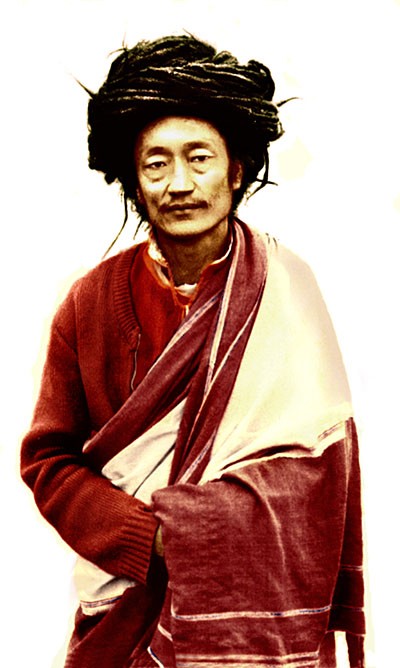 |
| Togden - a very cool type of Tibetan monk |
So, the plan is to hang out with monks, right? I figured I might as well learn a thing or two about Tibetan monasticism. A few months back I caught wind of a book called "Cave in the Snow," about one Tenzin Palmo, an English woman who became an influential Tibetan Buddhist nun. I read it over the long weekend.The book is a great look at the ins and outs of monastic life, as well as a good overview of issues currently being dealt with in the Tibetan Buddhist community. It is written from a faithful perspective, which increases its value immeasurably. I can dig on scholastic, detached methods, and they definitely have their place, but learning about a religion and religious community from a person who is invested in it just feels better. Scholarly skepticism tends to remove all talk of the miraculous, except to ridicule it, and relegates spiritual awakening to psychological imbalance or wishful thinking. Anywho, I'm off topic.
I'll share, for now, one topic I found interesting, and the way it tied in with my own religious background.This is from a talk given by Tenzin Palmo, after she had come out of 12 years of meditation in a cave in the Himalayas and began touring the world raising funds for building a nunnery.
Cave in the Snow 171
The reason we are not Enlightened is because we are lazy. There's no other reason. We do not bother to bring ourselves back to the present because we're too fascinated by the games the mind is playing. If one genuinely thinks about Renunciation it is not a giving up of external things like money, leaving home or one's family. That's easy. Genuine renunciation is giving up our fond thoughts, all our delight in memories, hopes and daydreams, our mental chatter. To renounce that and stay naked in the present, that is renunciation.
The reason we are not Enlightened is because we are lazy. There's no other reason. We do not bother to bring ourselves back to the present because we're too fascinated by the games the mind is playing. If one genuinely thinks about Renunciation it is not a giving up of external things like money, leaving home or one's family. That's easy. Genuine renunciation is giving up our fond thoughts, all our delight in memories, hopes and daydreams, our mental chatter. To renounce that and stay naked in the present, that is renunciation.
I really dig the whole "stay naked in the present" thing. We come naked into the world, humble and free, and we tend to leave it the same way. In between we accumulate a bunch of junk, in the mind and in the garage, and if we want to get to where we want to go we have to leave it all behind.
Ecclesiastes 5:12-16
The sleep of a laboring man is sweet, whether he eat little or much: but the abundance of the rich will not suffer him to sleep. There is a sore evil which I have seen under the sun, namely, riches kept for the owners thereof to their hurt. But those riches perish by evil travail: and he begetteth a son, and there is nothing in his hand.
As he came forth of his mother's womb, naked shall he return to go as he came, and shall take nothing of his labour, which he may carry away in his hand. And this also is a sore evil, that in all points as he came, so shall he go: and what profit hath he that hath laboured for the wind?
It seems like most labor is "for the wind." The monastic life is appealing to me because there is a conscious decision to break from the worldly, to refuse to labor any more for the wind than is necessary for sustenance. Some monks and nuns, from the Jain tradition (for example), remove themselves from all striving after the wind, depending entirely on the generosity of the faithful in a bold statement affirming the ability of the human race to be kind and charitable. In a world so obsessed with getting more, the sentiments of Tenzin Palmo and the Preacher of Ecclesiastes teach the value of being honest and transparent, focusing on the spiritual and eternal, eschewing"riches kept for the owners thereof to their hurt." From my own experience as an itinerant monk, under a vow of chastity and scarcity, living out of two suitcases and wearing the same clothing every day while depending on members of the church for food and housing, I came to cherish the simple life.
The Buddhist strives to take this to the next level. Not only is outward simplicity maintained, but the more important, inward parts of the human are streamlined and focused. When people ask Tenzin Palmo what she gained from those twelve years in the cave, she tells them that she didn't gain anything - the value of the experience was in what she lost. Dr. Keller (World Religions, BYU) always refers to the "monkey mind," and that's accurate. My personal spaces are pretty clean and organized, and the desktop on my computer is perpetually cleared of everything - I hate, hate, hate clutter. But if the state of my mind could manifest itself in the physical world, I would be a prime case for that Hoarders show I hear everyone talk about. There is so much stuff up there, and most of it is useless. Concentration becomes difficult because there are so many things for the monkey to jump around on - it's a friggin' junkyard playground. I wish there was a way to burn that mother down, start over, but there isn't. In Tibetan Buddhism, the long hours of meditation are spent removing the junk, bit by bit, until the spacious, green field that we started with is back. There are occasions, talked about by Zen practitioners and Alma and Paul, when a blaze of white light obliterates most of the stuff in the yard, but that is rare. I'm not counting on it.
The challenge, then, is to begin living in the moment, presently, truthfully, nakedly. Start removing myself from all the things I have around me, start removing myself from all the things I have in me, and arrive back at cultivating compassion, love, relationships, charity, truth - as Old Gregg would say, "All things that are good." Then maybe I'll be able to learn a thing or two from the monastics we meet, and be able to relate on a personal level.
Lori and I decided that we are going to India with the smallest amount of stuff possible - a backpack and a small suitcase for each, maybe. I'm hoping I can come back with even less.
P.S. Don't worry, friends - I'll still bring you your saris and Ganesh statues.


No comments:
Post a Comment